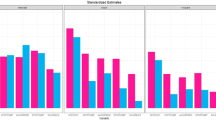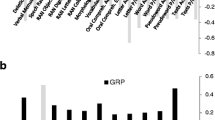Abstract
A follow-up of a representative sample of poor readers through secondary schooling confirmed persisting reading problems for most children. As a group, poor readers fell further behind a normal-reading comparison group during their early teens. Later reading progress was unrelated to gender, SES background, behavior problems or non-school attendance, though these factors did influence wider school attainments. Poor readers were more likely to leave school early, and had much depressed educational qualifications. There were no differences in the reading progress or academic attainments of specifically retarded (IQ-discrepant) and generally backward poor readers.
Similar content being viewed by others
References
Badian, N. A. (1988). The prediction of good and poor reading before Kindergarten entry: A nine-year follow-up,Journal of Learning Disabilities 21: 98–123.
Badian, N. A. (1990). Background factors and preschool test scores as predictors of reading: a nine-year longitudinal study,Reading and Writing: An Interdisciplinary Journal 2: 307–326.
Berger, M., Yule, W. & Rutter, M. (1975). Attainment and adjustment in two geographical areas II: The prevalence of specific reading retardation,British Journal of Psychiatry 126: 510–519.
Bruck, M. (1985). The adult functioning of children with specific learning disability: A follow-up study. In: L. Siegel (ed.),Advances in applied developmental psychology (pp. 91–129). Norwood NJ: Ablex.
Bruck, M. (1992). Persistence of dyslexics' phonological awareness deficits,Developmental Psychology 28: 874–886.
Byford, D. & Mortimore, P. (1980).School Examination Results in the ILEA, 1978 RS 759/80. Inner London Education Authority.
Clay, M. (1985).The early detection of reading difficulties, 3rd Ed. Tadworth, Surrey: Heinemann.
Cook, T. D. & Campbell, D. T. (1979).Quasi-experimentation: Design and analysis issues for field settings. Chicago: Rand McNally.
DeFries, J. C. (1988). Colorado Reading Project: longitudinal analyses,Annals of Dyslexia 38: 120–130.
DeFries, J. C. & Baker, L. A. (1983). Colorado Family Reading Study: Longitudinal analyses,Annals of Dyslexia 33: 153–162.
Fergusson, D. M. & Horwood, L. J. (1992). Attention deficit and reading achievement,Journal of Child Psychology and Psychiatry 33: 375–385.
Finucci, J. M. (1986). Follow-up studies of developmental dyslexia and other learning disabilities. In: S. D. Smith (ed.),Genetics and learning disabilities (pp. 97–121). Philadelphia: Taylor and Francis.
Finucci, J. M. Gottfredson, L. S. & Childs, B. (1985). A follow-up study of dyslexic boys,Annals of Dyslexia 35: 117–136.
Forell, E. R. & Hood, J. (1985). A longitudinal study of two groups of children with early reading problems,Annals of Dyslexia 35: 97–116.
Fredman. G. & Stevenson, J. (1988). Reading processes in specific reading retarded and reading backward 13 year olds,British Journal of Developmental Psychology 6: 67–108.
Gottesman, R., Belmont, I. & Kaminer, R. (1975). Admission and follow-up status of reading disabled children referred to a medical clinic,Journal of Learning Disabilities 8: 642–650.
Hinshaw, S. P. (1992). Externalizing behavior problems and academic underachievement in childhood and adolescence: Causal relationships and underlying mechanisms,Psychological Bulletin 111: 127–155.
Jorm, A. F., Share, D. L., Matthews, R. & Maclean, R. (1986). Behaviour problems in specific reading retarded and general reading backward children: A longitudinal study,Journal of Child Psychology and Psychiatry 27: 33–43.
Kavale, K. A. (1988). The long-term consequences of learning disabilities. In: M. C. Wang, M. C. Reynolds & H. J. Walberg (eds.),Handbook of Special Education (pp. 303–344). Oxford: Pergmon.
Kline, C. & Kline, C. (1975). Follow-up study of 211 dyslexic children,Bulletin of the Orton Society 25: 127–144.
LaBuda, M. C. & DeFries, J. C. (1988). Cognitive abilities in children with reading disabilities and controls: A follow-up study,Journal of Learning Disabilities 21: 562–566.
LaBuda, M. C. & DeFries, J. C. (1989). Differential prognosis of reading-disabled children as a function of gender, socioeconomic status, IQ and severity: A longitudinal study,Reading and Writing: An Interdisciplinary Journal 1: 25–36.
McMichael, P. (1979). The hen or the egg? Which came first — antisocial emotional disorder or reading disability?,British Journal of Educational Psychology 49: 226–235.
Maughan, B. (1989). Growing up in the inner city: Findings from the inner London longitudinal study,Paediatric and Perinatal Epidemiology 3: 195–215.
Maughan, B., Gray, G. & Rutter, M. (1985). Reading retardation and antisocial behaviour: A follow-up into employment,Journal of Children Psychology and Psychiatry 26: 741–758.
Muehl, S. & Forell, E. R (1973). A follow-up study of disabled readers: Variables related to high school reading performance,Reading Research Quarterly 9: 110–123.
NFER (1970).Manual of Instructions: Sentence Reading Tests. Windsor: National Foundation for Educational Research.
Neale, M. D. (1958).Neale Analysis of Reading Ability Manual. London: Macmillan.
Naylor, C. E., Felton, R. H. & Wood, F. B. (1990). Adult outcome in developmental dyslexia. In: G. Th. Pavlidis (ed.),Perspectives on dyslexia, Vol 2 (pp. 215–229) London: Wiley.
O'Connor, S. & Spreen, O. (1988). The relationship between parents' socioeconomic status and education level and adult occupational and educational achievement of children with learning disabilities,Journal of Learning Disabilities 21: 148–153.
Pennington, B. F., Gilger, J. W., Olson, R. K. & DeFries, J. C. (1992). The external validity of age- versus IQ-discrepancy definitions of reading disability: Lessons from a twin study,Journal of Learning Disabilities 25: 562–573.
Plewis, I. (1985).Analyzing change: Measurement and explanation using longitudinal data. Chichester: Wiley.
Raz, I. S. & Bryant, P. (1990). Social background, phonological awareness and children's reading,British Journal of Developmental Psychology 8: 209–225.
Rodgers, B. (1983). The identification and prevalence of specific reading retardation,British Journal of Educational Psychology 53: 369–373.
Rowe, K. J. & Rowe, K. S. (1992). The relationship between inattentiveness in the classroom and reading achievement (part B): An exploratory study,Journal of the American Academy of Child and Adolescent Psychiatry 31: 357–368.
Rutter, M., Cox, A., Tupling, C., Berger, M. & Yule, W. (1975). Attainment and adjustment in two geographical areas-I. The prevalence of psychiatric disorder,British Journal of Psychiatry 126: 493–509.
Rutter, M., Maughan, B., Mortimore, P. & Ouston, J. (1979).Fifteen thousand hours: Secondary schools and their effects on children London: Open Books.
Rutter, M., Tizard, J. & Whitmore, K., (eds.) (1970).Education, health and behaviour. London: Longman.
Rutter, M., Tizard, J., Yule, W., Graham, P. & Whitmore, K. (1976). Isle of Wight studies 1964–1974,Psychological Medicine 6: 313–332.
Satz, P., Taylor, H. G., Friel, J. & Fletcher, J. M. (1978). Some developmental and predictive precursors of reading disabilities: a six-year follow-up. In: A. Benton & D. Pearl (eds.),Dyslexia: An appraisal of current knowledge (pp. 313–349). New York: Oxford University Press.
Shaywitz, B. A., Fletcher, J. M., Holahan, J. M. & Shaywitz, S. E. (1992). Discrepancy compared to low achievement definitions of reading disability: Results from the Connecticut Longitudinal study,Journal of Learning Disabilities 25: 639–648.
Shaywitz, S. E., Shaywitz, B. A., Fletcher, J. M. & Escobar, M. D. (1990). Prevalence of reading disability in boys and girls: Results of the Connecticut Longitudinal Study,Journal of the American Medical Association 264: 998–1002.
Schonhaut, S. & Satz, P. (1983). Prognosis for children with learning disabilities: A review of follow-up studies. In: M. Rutter (ed.),Developmental Neuropsychiatry (pp. 542–563). New York: Guilford Press.
Spreen, O. (1987).Learning disabled children growing up: A follow-up into adulthood. Swets & Zeitlinger, Lisse, Netherlands.
Spreen, O. (1988). Prognosis of learning disability,Journal of Consulting and Clinical Psychology 56: 836–842.
Stanovich, K. E. (1986). Matthew effects in reading: Some consequences of individual differences in the acquisition of literacy,Reading Research Quarterly 21: 360–407.
Stanovich, K. E. (1991). The theoretical and practical consequences of discrepancy definitions of dyslexia. In: M. Snowling & M. Thomson (eds.),Dyslexia: Integrating theory and practice (pp. 125–143). London: Whurr.
Stevenson J. & Fredman, G. (1990). The social environmental correlates of reading ability,Journal of Child Psychology and Psychiatry 31: 681–698.
Sturge, C. (1982). Reading retardation and antisocial behaviour,Journal of Child Psychology and Psychiatry 23: 21–31.
Temple, C. (1990). Foop is still Floop: A six year follow-up of phonological dyslexia and dysgraphia,Reading and Writing: An Interdisciplinary Journal 2: 209–221.
Trites, R. L. & Fiedorowicz, C. (1976). Follow-up study of children with specific (or primary) reading disability. In: R. M. Knights & D. J. Bakker (eds.),The neuropsychology of learning disorders: Theoretical approaches (pp. 41–50). Baltimore: University Park Press.
Van der Wissel, A. & Zegers, F. E. (1985). Reading retardation revisited,British Journal of Developmental Psychology 3: 3–19.
Wechsler, D. (1949).Wechsler Intelligence Scale for Children (Manual) New York: The Psychological Corporation.
Yule, W. (1967). Predicting reading ages on Neale's analysis of reading ability,British Journal of Educational Psychology 37: 252–255.
Yule, W. (1973). Differential prognosis of reading backwardness and specific reading retardation,British Journal of Educational Psychology 43: 244–248.
Author information
Authors and Affiliations
Rights and permissions
About this article
Cite this article
Maughan, B., Hagell, A., Rutter, M. et al. Poor readers in secondary school. Read Writ 6, 125–150 (1994). https://doi.org/10.1007/BF01026909
Issue Date:
DOI: https://doi.org/10.1007/BF01026909




